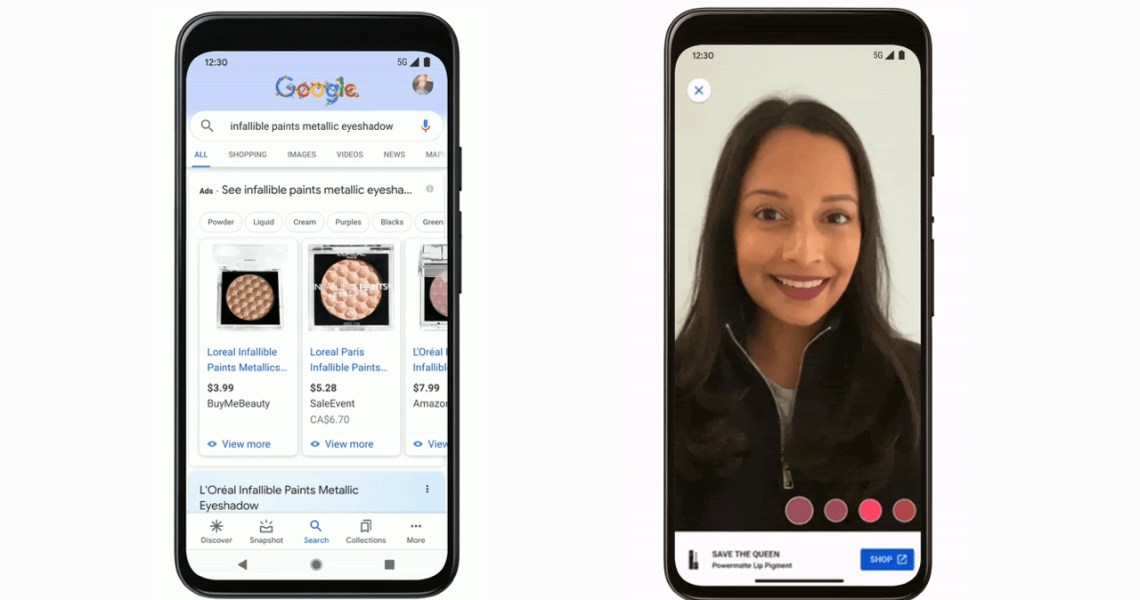As the pandemic renders physical product testing a thing of the past, top tech giants are doubling down on virtual makeup try-on to drive e-commerce sales.
In December, both Snapchat and Google launched AR makeup try-on initiatives with beauty tech partners. Google announced its new AR makeup tool on December 17 via partnerships with Perfect Corp and L’Oréal Group-owned ModiFace. It allows users to access virtual try-on for specific beauty products in Google’s mobile app via its main search or Google Shopping. Snapchat, meanwhile, announced on December 10 its new partnership with Perfect Corp that will go into effect on a date “early this year,” according to a company spokesperson. It will allow brands to incorporate their Perfect Corp makeup try-on as a Snapchat Lens and create a virtual storefront.
“These partnerships are going to expose Perfect Corp’s technology to a broader audience,” said Perfect Corp founder and CEO Alice Chang, who said they will “make virtual try-on experiences the norm for consumers.” During the pandemic, Perfect Corp has seen a 32% increase in consumer use of virtual try-on. She noted that conversations with both Google and Snapchat began in 2019, but were “accelerated” by Covid-19.
Brands offering the AR try-on via Google include those from the L’Oréal Group and Estée Lauder Companies portfolios, as well as independent labels like Blk/Opl. Some of the products available for try-on include Nars Multi-Use Gloss, Revlon Lip Polish Vinyl Ultra HD, NYX Vivid Brights Creme Colour and Urban Decay Liquid Moondust Eyeshadow.
Lubomira Rochet, chief digital officer of L’Oréal, said the Google feature is aimed at “making online shopping more convenient and fun.”
Virtual try-on is also a much-needed attempt to solve for the halted sampling, associate consultations and sales done in store.
“Even before the pandemic, people were growing apprehensive to community testers and hygiene worries,” said Chang. “With the rise of global health concerns surrounding the pandemic, physical testers are quickly being replaced by hyper-realistic digital try-on experiences.” Perfect Corp’s business model includes both B2B and B2C components, with over 300 B2B brand partners such as Estée Lauder and Nars, and 900 million global downloads of its own app.
Ad position: web_incontent_pos1
“Technology services like Google’s virtual try-on and augmented reality are changing the landscape of online shopping in the beauty industry, and proving to be highly successful digital tactics … especially as [shoppers’] preferences and expectations shift due to the global pandemic,” said Salima Popatia, svp for global customer acquisition and retention at The Estée Lauder Companies.
All beauty brands working with Perfect Corp will have the option to incorporate the AR try-on into Snapchat. According to Carolina Arguelles Navas, head of product marketing for augmented reality at Snap Inc., the new partnership “will save [brands] time and money based on what they’ve already created, increase their reach with an extremely engaged community and allow them to learn about their audience through Snapchat’s insights.” Prior to the Perfect Corp partnership, Snapchat had already partnered with beauty brands including Sally Hansen and NYX for virtual try-on.
On Snapchat, brands can use the AR feature to drive both brand awareness and conversions. According to Navas, “Snapchat campaigns that include shoppable AR Lenses see a 2.4-times higher action intent lift, compared to the Q3 average.”
Snapchat’s development of e-commerce is part of a broader push among social platforms to develop social shopping. The app added in-app shopping in 2018 and has been expanding shopping features since then. Instagram, meanwhile, has especially doubled down on shopping features during the pandemic, while TikTok launched livestream shopping in December. Snapchat most recently reported that it has 249 million daily active users in total, while TikTok has reported over 50 million daily active users for just the U.S. Facebook has not shared user numbers for Instagram in 2020, but it reported 1 billion monthly active users in 2018.
Chang noted that the technology will be “especially valuable in drugstore and online retail environments, which weren’t able to offer this type of experimentation.”
Ad position: web_incontent_pos2
“Virtual beauty is no longer a ‘nice to have’ for beauty brands and retailers; it’s a ‘must have,’” she said.




